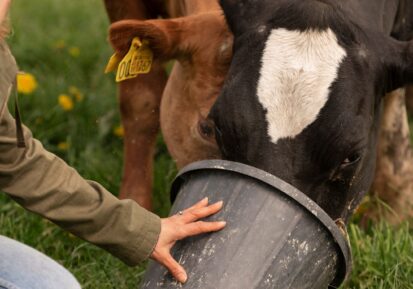Blog

Understanding the Synergy Between Vitamins and Other Nutrients in Cattle Diets

A comprehensive approach to cattle nutrition is provided by KNC Nutrition, which delves into the complex relationship between vitamins and other essential nutrients. Vitamins for cattle are important because they boost immunity, maintain overall health, and promote faster growth rates. Their full potential is realized when they work together with other essential nutrients.
The Function of Vitamins for Cattle Nutrition
Vitamins for cattle are organic compounds needed in small amounts to sustain life and promote health. They are essential for many physiological processes, such as growth, reproduction, and immunity. Some of the most important vitamins for cattle are:
- Vitamin A: Necessary for immune system support, vision, growth, and reproduction;
- Vitamin D: Necessary for bone health, calcium and phosphorus metabolism;
- Vitamin E: Functions as an antioxidant, supporting immune system function and reproductive health;
- Vitamin K: important for blood clotting and bone metabolism;
- B vitamins (thiamine, riboflavin, niacin, etc.): Are essential for energy metabolism, nerve function, and red blood cell formation.
While each vitamin has specific roles, its efficacy is significantly influenced by its interaction with other nutrients in the diet.
The Interaction of Minerals and Vitamins for cattle
Inorganic elements like minerals are just as vital to the health of cattle. These consist of trace minerals like zinc, copper, and selenium and microminerals like calcium, phosphorus, and magnesium. The interplay between vitamins and minerals is fundamental for optimal cattle nutrition.
Vitamin D and Calcium/Phosphorus: Vitamin D facilitates the absorption of calcium and phosphorus, which are critical for bone health and growth. Without adequate Vitamin D, cattle cannot effectively utilize these minerals, leading to deficiencies.
Vitamin E and Selenium: Acting as antioxidants, they protect cells from oxidative damage. Vitamin E needs selenium to function properly, and together, they enhance immune response and reproductive efficiency.
Vitamin A and Zinc: It plays a role in the metabolism of Vitamin A. Adequate zinc levels ensure proper utilization and storage of Vitamin A, which is essential for vision, skin health, and immunity.
The Significance of a Balanced Diet
Maintaining a balanced diet that contains the appropriate amounts of vitamins, minerals, proteins, and additional nutrients is crucial for the well-being and efficiency of livestock. At KNC Nutrition, we focus on the following points:
In-depth Feed Evaluation: Consistently analyzing feed to confirm it fulfills the nutritional needs of livestock, including all vital vitamins and minerals.
Personalized Nutrient Supplements: Offering customized vitamin and mineral supplements that are specific to the herd’s needs, taking into account aspects such as age, health condition, and production objectives.
Regular Health and Performance Checks: Ongoing observation of livestock health and performance, and necessary modifications to their diet to correct any nutritional deficiencies or imbalances.
Grasping how vitamins and different nutrients work together in the diets of cows is essential for enhancing their overall well-being and productivity. By acknowledging how vitamins, minerals, and proteins rely on each other, farmers can make sure their cows get the full range of nutrients necessary for their growth. At KNC Nutrition, we pledge to offer feeds and supplements scientifically designed to maintain the delicate equilibrium of essential vitamins for cattle. With the proper nutrition strategy, your cows can reach their highest potential in terms of performance and health. For more details, you can visit our website.

